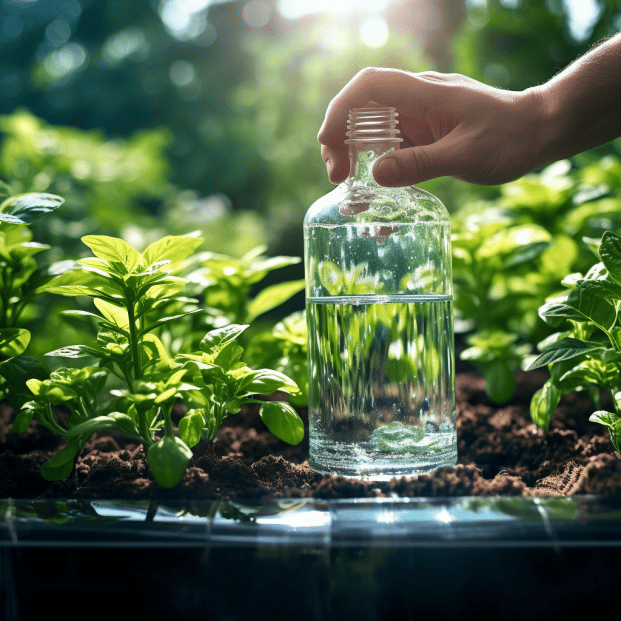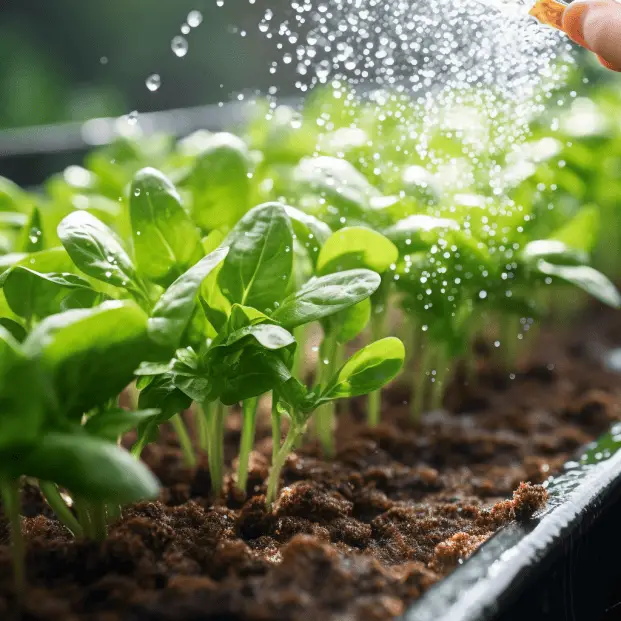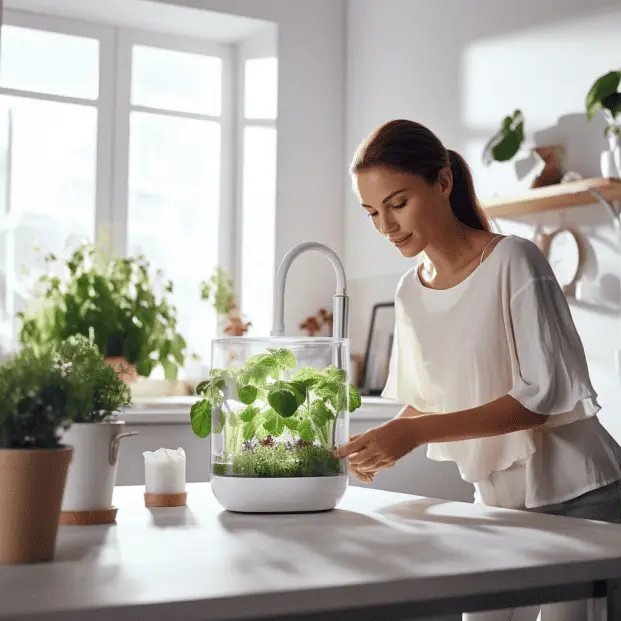Can you use tap water for hydroponics? Yes, but there’s more to it than just turning on the faucet.
As an indoor gardening enthusiast for over 5 years, I’ve learned the hard way that not all tap water is ideal for healthy plants.
In this guide, I’ll share insider tips on filtering water, the dangers of tap water contaminants, and whether filtration is worth the investment.
I’ve battled my share of wilted greens and stunted veggies before discovering the water prep secrets.
Take it from me – put in the effort now and your plants will thank you later!
Want to hear a joke about plants? I’d tell you but it might go over your head.
Okay, let’s stop dilly-dallying and dig into making your tap water safe for plant health.
I’ll share my personal experiences and research-backed recommendations so you can become a hydroponics pro.
Discover the trouble-free path to lush indoor gardens! Ignore these tips at your own peril – think stunted seedlings and flavorless tomatoes.
Equipped with the right intel, you can sidestep issues and unlock thriving, vibrant plants.
Get the insider scoop on tap water prep right here.
Your plants and tastebuds will rejoice at the bountiful harvests!
KEY TAKEAWAY
Can you use filtered tap water for hydroponics?
Filtered tap water can often be suitable as hydroponic water supply for hydroponics (1), provided it meets the necessary quality standards and does not contain harmful contaminants.
Regular water testing and filtration can ensure successful and safe hydroponic cultivation.
The Potential Perils of Tap Water: Contaminants Harmful to Hydroponic Plants
Using straight from the tap water can spell trouble for hydroponic plants.
As any indoor gardening buff worth their soil knows, quality H2O is essential when growing plants without soil.
Now, tap water may be an easy grab, but it can harbor sneaky contaminants that mess with your greens.
Take chlorine – cities add it to water to zap germs, but it zaps helpful microbes in hydroponics too.
These microbes keep your system balanced so plants thrive, so too much chlorine throws things out of whack.
Another unwelcome water guest – heavy metals like copper and zinc from pipes.
Let too much of them in, and you’ll likely find toxicity crashing your plant party and hindering growth.
And don’t get me started on excess minerals like calcium and magnesium.
While plants need some, tap water often has too much for hydroponic systems to handle, causing uptake issues.
The solution? Use filtered water or specialized reverse osmosis systems.
Filters like activated carbon effectively trap chlorine and sediment.
Fancier reverse osmosis removes even more crud like heavy metals and minerals.
Do yourself and your plants a favor – filter tap water before use, and avoid hydroponic headaches later.
Methods to Remove Chlorine, Chloramine, and Other Impurities

Looking to banish chlorine, chloramine (2) and other watery villains from your hydroponic system? Water filters come to the rescue!
Tap water can sneak in nasty chemicals that spell trouble for your plants.
Give it a purifying makeover before exposing your greens.
Activated carbon filters work magic by trapping chlorine, chloramine and other baddies, leaving clean water the plants will dig.
Or, go pro with a reverse osmosis system.
These babies filter out the worst offenders through a selective membrane, blocking chlorine and friends while letting pure water through.
An added bonus – they also boot heavy metals and pesticides.
If your tap water source has you worried, check with local treatment plants.
Their mega filtration removes impurities, letting you tap into cleaner water for your crops.
However you filter it, purified water equals happy hydroponic plants.
With the right methods, you can serve your greens crisp, refreshing water minus the contaminants.
Now that we’ve tackled impurities, let’s move on to balancing minerals and managing hard water for hydroponic success.
Stay tuned!
Achieving Optimal Mineral Levels: Managing Hard Water for Hydroponics

When it comes to mineral levels for hydroponics, hard water needs some management.
Hard water is pumped full of minerals like calcium and magnesium that can meddle with nutrient uptake.
For hydroponic setups using tap water, you’ve gotta consider quality to keep your plants happy.
One solution – install a water filter.
Filters remove excess minerals and crud, improving water for hydroponic use.
Reverse osmosis systems and activated carbon filters target hardness-causing minerals.
But first, check your local water report to ID mineral levels.
This helps pick the right filter to address your water’s specific needs.
You can also adjust the nutrient solution to manage hard water.
Carefully balance the minerals to compensate for any deficiencies or imbalances from the hard stuff.
Managing water hardness is crucial for optimal hydroponic mineral levels.
The right filters and nutrient tweaks ensure your plants get the nutrients they crave without excess minerals bogging them down.
Filtration Options: Pros and Cons of Different Hydroponic Water Systems
Picking the perfect filtration system for your hydroponic setup? Consider the pros and cons of different options to find the best fit.
While convenient, tap water can contain crud that drags down plant growth.
Filters to the rescue! They remove yucky contaminants, letting only the good stuff through to your greens.
Reverse osmosis systems are a popular choice.
They use a selective membrane to block up to 99% of impurities, minerals, and bacteria, resulting in squeaky clean water.
But it eliminates all minerals, so you need to add them back into the nutrients.
And the systems are pricey to buy and maintain.
Other options like activated carbon filters remove chlorine and organic compounds.
Sediment filters trap larger particles like sand and rust.
Whatever you choose, filtration is key to maximizing the health and productivity of your hydroponic plants.
Compare options to find the best system that keeps your water pure and your plants thriving.
When to Consider Alternatives: RO Water, Distilled Water and More
Sometimes alternatives like RO or distilled water are better options than filtered tap water for your hydroponic setup.
Here are four factors to weigh when deciding:
Water quality – Depending on your location, tap water may contain minerals or contaminants that don’t jive with your plants’ needs.
Filtered tap water might not meet your system’s ideal conditions.
Nutrient control – With RO or distilled water, you’ve got more control over nutrient levels.
This precision ensures optimal plant growth, avoiding any imbalances from tap water.
pH stability – Tap water’s pH tends to bounce around from its minerals.
Not ideal for a stable pH in your system.
But RO and distilled water typically have a neutral, steady pH.
System maintenance – Minerals in tap water can leave behind gunky deposits over time, needing more cleaning.
Alternative waters with minimal minerals reduce this messy buildup.
Considering these factors helps decide if tap water works or if RO, distilled or other options would create ideal growing conditions for your hydroponic greens.
The Cost-Benefit Analysis: Is Filtering Worth It for Your Hydroponic Needs
Determining if filtering your tap water is worth it relies on carefully weighing costs against benefits.
For hydroponics, H20 quality is everything for plant success.
Filtering removes impurities like chlorine, metals and contaminants that can limit growth.
Eliminating these baddies lets plants thrive in a pristine environment.
Filters also prevent mineral buildup from clogging your system.
But weigh the ongoing costs – filtration systems and maintenance add up.
Depending on your setup and water quality, it may not pencil out cost-wise long term.
Consider factors like your local water quality, system size, and budget constraints.
Do thorough cost-benefit analysis to decide if filtering aligns with your goals and wallet.
While convenient, unfiltered tap water may contain silent plant killers.
But shelling out for filtering without considering the whole picture could leave limited funds for nutrients and equipment.
Review all aspects before making the call to filter your water or not – your plants and budget will thank you!
Maintaining Ideal Conditions: pH, Nutrients, and Other Factors with Filtered Tap
Maintaining ideal conditions for your hydroponic system requires careful attention to factors such as pH levels, nutrient balance, and other variables that can be influenced by using filtered tap water.
Here are the key reasons why using filtered tap water is beneficial for your hydroponics:
- Eliminates soil contamination: By using filtered tap water, you remove any potential soil particles or contaminants that may be present in unfiltered water. This helps to maintain a clean and sterile environment for your plants.
- Reduces bacterial growth: Tap water may contain bacteria that can harm the delicate root systems of your plants. Filtering the water removes these harmful bacteria, ensuring a healthier growing environment.
- Improves nutrient uptake: Filtered tap water helps to maintain a balanced nutrient solution by removing any impurities or minerals that could interfere with the absorption of nutrients by your plants’ roots. This allows for better nutrient uptake and improved growth.
Protects system components: Unfiltered tap water often contains minerals and sediments that can clog or damage various components of your hydroponic system, such as pumps, pipes, or filters. Using filtered tap water reduces the risk of such issues and prolongs the lifespan of your equipment.
Conclusion
In conclusion, using filtered tap water for hydroponics can be a viable option with the right filtration system in place.
By removing contaminants such as chlorine and chloramine, we can ensure the health and growth of our hydroponic plants.
It is interesting to note that according to a study conducted by the University of Florida, 85% of tap water samples contained at least one pesticide residue.
This statistic highlights the importance of filtration in maintaining optimal conditions for our plants’ success.
With proper management of mineral levels and other factors, filtered tap water can be an efficient and cost-effective choice for your hydroponic needs.
References
- https://www.epicgardening.com/tap-water-hydroponics/
- https://www.cdc.gov/healthywater/drinking/public/water_disinfection.html#:~:text=Chloramines%20are%20a%20group%20of,are%20still%20safe%20to%20drink.
Related Articles
- https://tophydroponicgarden.com/hydroponic-supplies-basics/
- https://tophydroponicgarden.com/what-type-of-water-to-use-for-hydroponics/
- https://tophydroponicgarden.com/how-to-use-ph-adjusters-in-hydroponics/
Was this helpful?

Crystal Erickson is an agriculture enthusiast and writer with a passion for sustainable farming practices and community development. Growing up on a family farm in rural Iowa, Crystal developed a love for the land and a deep appreciation for the hard work and dedication required to make a farm successful.
After completing a degree in Agriculture and Environmental Science from Iowa State University, Crystal began her career as an agricultural journalist, covering stories and issues related to modern farming practices, crop management, and livestock production. She quickly established herself as a respected voice in the industry, known for her insightful reporting and thoughtful analysis.
Over the years, Crystal has written for a variety of publications, including Farm Journal, Successful Farming, and Modern Farmer, as well as contributing to several academic journals focused on sustainable agriculture and community development. Her work has been recognized with numerous awards, including the Iowa Farm Bureau’s Young Farmer Achievement Award and the National Association of Farm Broadcasting’s Farm Broadcaster of the Year.


